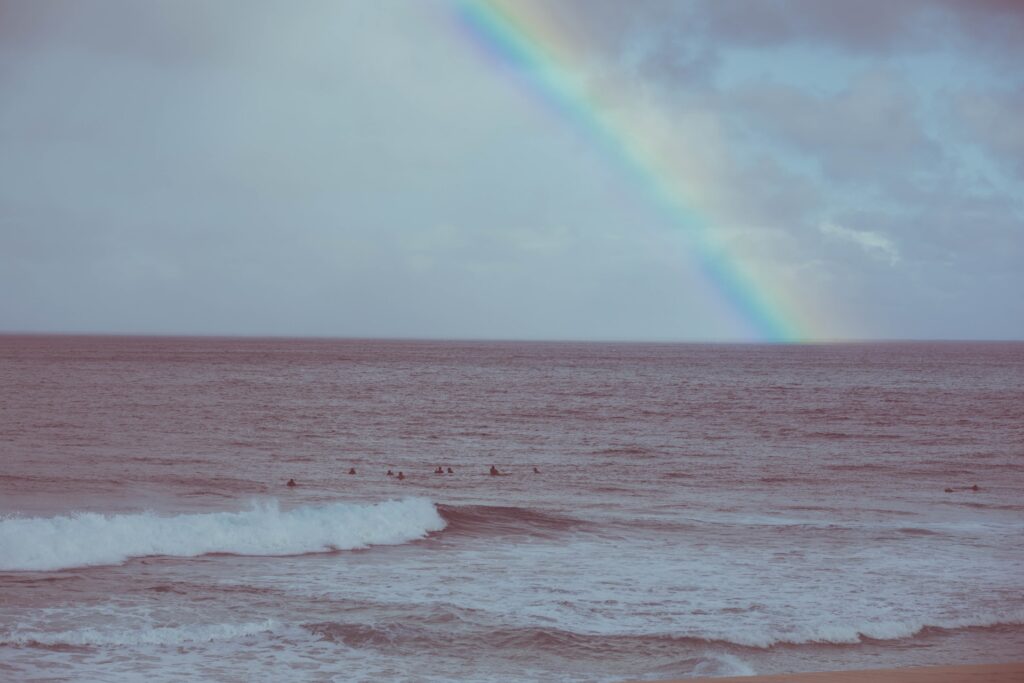The Channel Islands have hosted men and women for at least 12,000 years.
The first were the Chumash, and you are going to the place of their birth.
The Chumash don’t call it Santa Cruz Island. The conquering Spaniards gave it that name after the Chumash returned a staff left behind by one of their friars. The staff was topped with a cross (cruz), and the conquerors made note of this on their maps.
But to the Chumash, it will always be Limuw. This was where Hutash, the Earth Mother fashioned the Chumash people from the seeds of the Magic Plant. For three days and two nights you and your sisters will root yourselves into the very center of the Chumash universe.
Life was good in Limuw, but over time the island could no longer support the growing population. Hutash created a high, arching rainbow bridge linking the island to the mainland. A number of the people were told to cross the bridge, to populate the mainland. Many made the crossing safely, but others made the mistake of looking down. Seized by vertigo, a number of the Chumash people fell from the bridge into the cold and choppy waters of the channel.
Hutash felt badly about this. The people were following her direction when they fell and she did not want them to drown. This is why Hutash changed those that fell into dolphins. They continue to frolic in the channel to this very day.
As I retell this creation story, I am struck by the culminating final moments of D&T Grind: Down and Out, our recently completed winter backpacking trip. There were sixteen of us, men and women, and we were backpacking the Skyline-to-the-Sea trail through the Santa Cruz mountains and out to the beach. We arrived just as the sun was setting. And there we saw dolphins playing in the surf and the smear of a rainbow high in the ruddy sky.
It’s a powerful reminder of the links we share. It’s easy to appreciate the creation myth of a people as a quaint story to be shared over cocoa. I write this as a Muslim man, aware that those who are differently affiliated will understand my beliefs as a similarly quaint story.
But my adopted Abrahamic mythology has nothing to do with why I choose to be a Muslim. Rather, I am a Muslim because I have yet to encounter an articulation of the human condition more detailed, lucid, and resonant than that of the Islamic account.
And while I cannot speak for the Chumash, I imagine that their exposure to the elements, their keen awareness of lunar, solar, and tidal rhythms, and the propinquity they enjoyed with the beasts of the channel left them feeling entirely connected to Hutash and her bridge.
There is a transcendent point where we begin to understand that what is being related in these stories is the tension between hardship and ease, between rigor and relief, and between the absurdity of life and the certainty of death.
Soon enough, you will be writing yourself into the story of the island. You will be forced to find language that will honor not only your personal experience, but language that also has some potential of transmitting what you will be taught through the island.
This language may involve other than words. This language may involve laughter or a sigh. This language may require your body to sway. This language may require that you plait long blades of grass together or that you carve shapes into the sand.
But whatever language you choose, remember to include this in your telling:
You are not the first.
Leave a comment below for posterity or join us in the D&T Chautaqua Discord to discuss this post with other adventurous spirits from around the world.


Are there any stories from the point of view that the origin of these people or a people was along the coast for instance and then many of them fled to the islands? Will we be able to meet any of the descendents of the Chumash?
Salam Karima!
I’m not an expert on the Chumash and neither am I aware of any variants of the Rainbow Bridge.
The portion of the island that is open to the public has a rotating cadre of rangers. I haven’t met any Chumash.
But there is a documentary about the Chumash people that you might be interested in called 6 Generations. You can find a trailer on YouTube. We could organize a screening, or even a trip to the Chumash Indian Museum. I would really love this!
Ahmed